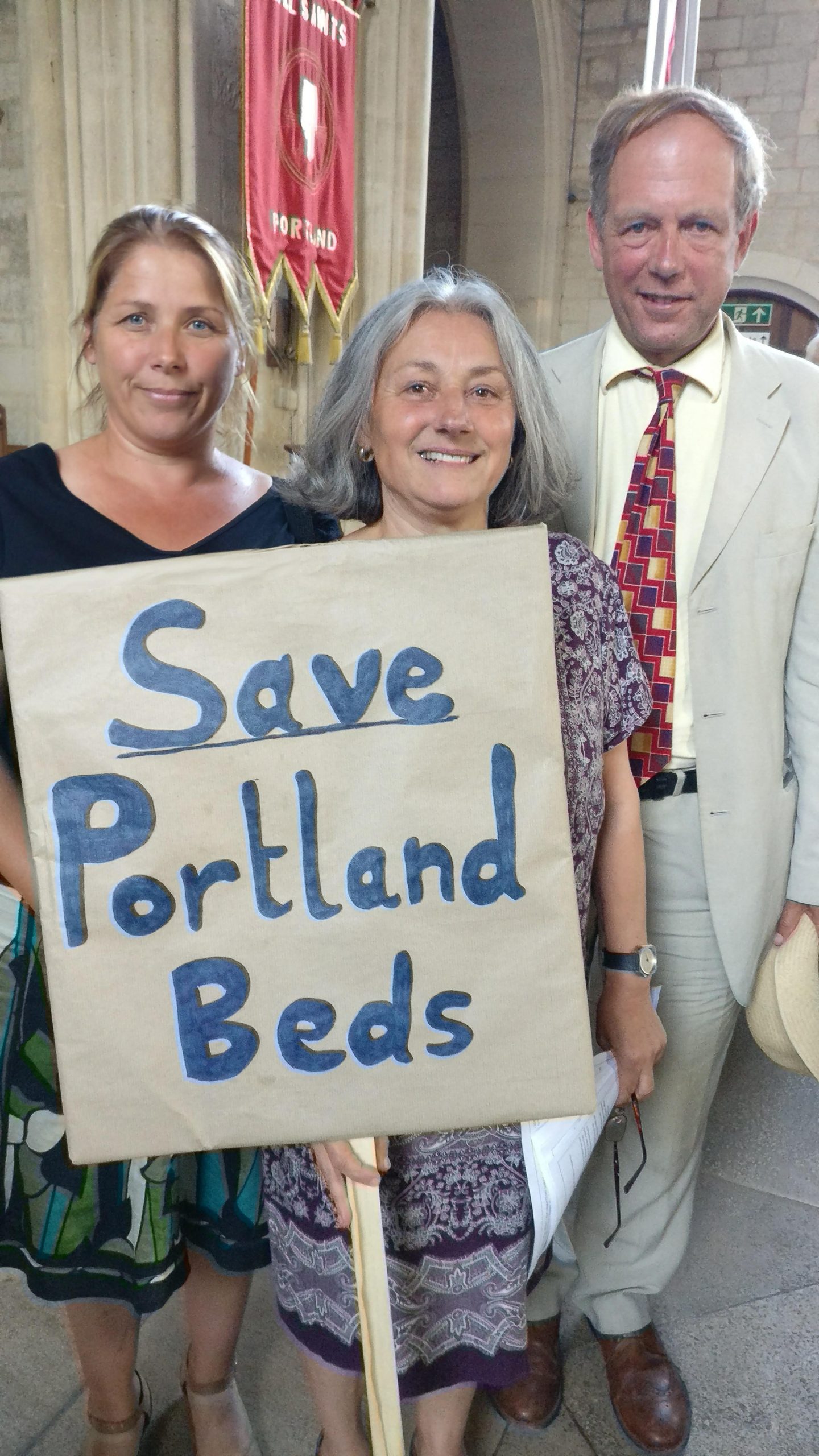On 5 July almost 200 residents attended a public meeting (at short notice) to unanimously voice their opposition to the planned closure of 16 beds at Portland Community Hospital.
The message they sent was very clear – losing the beds would not only remove a valuable resource from the community, but would also mark another step in the ongoing erosion of Portland’s infrastructure and with it the fundamental facilities and systems required to support its growing and ageing community.
Portland Community Hospital is located in the most deprived location in Dorset. Anarea recently ranked 322 out of 324 local authorities in England in terms of social mobility prospects for those with a disadvantaged background. Child poverty is high, average weekly pay is the lowest in the UK and key indicators show that prompt action is needed to improve overall health and life expectancy. Portland is a community that is already reeling under the impact of past cuts and evolving challenges, all of which are directly impacting on our health and wellbeing.
Government targets state 90 homes per year need to be built on Portland (approx 600 currently under construction or planned). There are plans for 3,000 new jobs to be created locally. These factors, combined with our ageing population, will further increase demand on our already depleted health and social care services – a demand that cannot be satisfied by partial provision in Weymouth (with 1950 new homes planned) or by our county hospital in Dorchester (with 3,500 new homes planned).
Portland’s geographical setting sets it apart from other areas in Dorset. With one road on and off the Island, 14 miles from DCH and even further from other specialist provision – Portland’s residents are already disadvantaged in their ability to receive prompt and effective medical care. Visiting loved ones in hospitals off the Island, especially for older residents, can be hugely challenging. Around ¼ of residents don’t drive, there is no direct public transport to DCH or surrounding community hospitals and taxi/bus fares are prohibitively high. Closing these beds means you are directly compromising the ability of residents to engage with loved ones, often in the late stages of life. This is not acceptable.
The key reason given for closing these beds is the inability to recruit adequate staff to guarantee the safety of patients. We understand, however, that staff have not been given the option to work at Portland for some time because it’s no longer an option on the staffing rota? Also, once staff know that a ward is to be closed they are unlikely to apply to work there.
Perhaps an approach where existing staff can choose to work at Portland and where potential recruits are offered accommodation to encourage a move, would ease any staffing issues? All over the country, “key workers” are assisted to find housing close to work. What efforts have you made to support nurses and ancillary staff in Portland?
Local residents believe you should revisit the planned closure of Portland’s 16 community hospital beds as a matter of urgency, particularly as you have no clear plan for what will replace the Island’s current and inadequate healthcare facilities.
Instead, plans should be advanced to develop and invest in the hospital and local surgeries as part of a new strategy for healthcare in the area. This work should be a collaborative endeavour between NHS workforce representatives, health workers and community groups – an approach that is already evident in many areas where healthcare provision is working to maximum impact.
Mr Shields – you state that you want to consult with local people in order to build a new person-focused, localised service. We ask that you do this BEFOREclosing the hospital’s beds. We have a right to effective local health services – including a hospital, which needs to be developed, not rundown until inevitable closure.
Mr Drax – you told us at the Portland meeting that you had heard and understood our views. Also, that you were against these cuts. We ask what more will you now be doing to meet our needs and protect the interests of your constituents in Portland and across South Dorset?
Yours sincerely
Clare Moody MEP South-West England (on behalf of my constituents)
Alan Chedzoy – Hon Alderman, Weymouth and Portland Borough Council (WPBC)
Cllr Kate Wheller – Dorset County Council, WPBC
Cllr Paul Kimber – WPBC
Cllr Ray Nowak – Portland Town Council (PTC), WPBC
Cllr J Draper – PTC
Cllr Tia Roos – WPBC
Cllr Charles Flack – Mayor of Portland, PTC
Cllr Rod Wyld – PTC
Cllr Jo Atwell – PTC
Councillor David and Mrs L Thurston – PTC
Cllr S West – PTC, WPBC
Cllr Lucy Hamilton – WPBC
Cllr Dr J Orrell – DCC
Cllr C Huckle – WPBC
Cllr O Kanji – WPBC
Cllr D Harris – DCC
Cllr J Farquharson – WPBC
R Kayes – retired councillor, DCC
Kim Wilcox, CEO, Island Community Action
Tim Nicholls – Secretary, Dorchester, Weymouth and Portland Trades Union Council
Mrs M Collins, Chair, South Dorset Labour Party
Mrs Claudia Sorin, Vice-Chair Dorchester Labour Party
Mr P Marfleet – Convenor, Weymouth and Portland Action on Wages (WeyPAW)
Rosemary Smeeton – Chair, Patient Participation Group
Ms D Monkhouse, Defend Dorset NHS
Ms G Lewis – Save Portland Beds
– and more 100 others.
Please note: people can add their names as signatories by emailing:[email protected] or [email protected]












